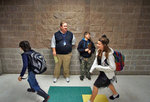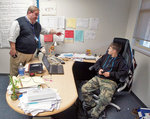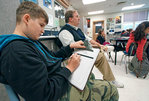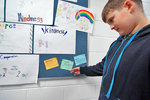As his classmates paraded around campus in Halloween costumes Friday, Oct. 31, 11-year-old Taylor Meeker proudly posed as Chimacum Middle School's principal.
It wasn't some clever ploy to put the …
This item is available in full to subscribers.
We have recently launched a new and improved website. To continue reading, you will need to either log into your subscriber account, or purchase a new subscription.
If you had an active account on our previous website, then you have an account here. Simply reset your password to regain access to your account.
If you did not have an account on our previous website, but are a current print subscriber, click here to set up your website account.
Otherwise, click here to view your options for subscribing.
* Having trouble? Call our circulation department at 360-385-2900, or email our support.
Please log in to continue |
|






As his classmates paraded around campus in Halloween costumes Friday, Oct. 31, 11-year-old Taylor Meeker proudly posed as Chimacum Middle School's principal.
It wasn't some clever ploy to put the school's actual principal, Stewart Prince, on the spot, but rather a reward for Meeker's recent display of good behavior.
Among other improvements that Prince and counselor Beth Clifford have implemented this school year is a prevention-oriented program called Positive Behavior Interventions and Supports (PBIS), in an effort to encourage positive behavior. Prince said he's already seeing an impact, and Meeker is one of the program's first beneficiaries.
“Ever since I took over last year, we have been focusing on holding kids responsible and accountable for their behavior and communicating better with parents,” he said, acknowledging that up until this school year, teachers and administrators had practiced reactionary discipline rather than rewarding positive behavior. “The idea now is that we've started focusing on kids doing positive things around the school and recognizing them for that, and changing the perspective of kids in our school and community.”
One other student – sixth-grader Katie Clark – ruled the school as principal for half a day the following Friday, Nov. 7.
During the 2012-13 school year, the school recorded 1,200 office referrals, Prince said. That fell to 500 during the 2013-14 school year, which also saw 53 suspensions for drug-, alcohol- and tobacco-related problems, he said. For the two-month period of September and October 2014, Prince said office referrals have fallen some 70 percent from the same period last year.
The school has reduced its class schedule from six periods per day to five, and teachers now focus on teaching specific grade levels in core subjects such as humanities, sciences and mathematics.
“The whole idea is to move the teachers away from their area of study and to understand all classes must work together to be successful,” Prince said, adding that the shift is partly to prepare students for the new Common Core State Standards. “Schools have been structured for 100 years where all these subjects are taught in a vacuum. We want kids to understand that as they move from class to class, writing doesn't stop, it just changes focus. It's really important for middle school kids because it helps them think on a much deeper level.”
The school has also implemented Scholastic's Read 180 online reading intervention program, which provides a small library of skill-level-appropriate books that are used in a class created specifically for students who have fallen behind in their reading level. Meeker, a sixth-grader, is one of those students.
When reading teacher Patti Clarke asked her students to begin reading during a recent class, Meeker wasted no time, but noticed others were a bit slow to get on task.
“I saw someone pull out their cell phone,” he said as he recalled his fellow students' behavior that day. “But I just started reading.”
Although he said he would prefer to be drawing, he opened a book called “Danger Is My Business” and began reading. Clarke promptly handed him a slip acknowledging his willingness to cooperate.
Meeker deposited that slip into a fishbowl in the school's main office and was later selected at random for a reward – a chance to be the school's principal for half a day.
Through the PBIS program, students can be rewarded for displaying self-control, cooperation, responsibility, goal setting, courage, service, self-esteem, integrity and humanity, among other things. Teachers and administrators give students corresponding slips of paper, which can then be entered into a weekly drawing.
With Prince at his side, Meeker walked the halls, a two-way radio in his hip, a clipboard in his hand and a smile on his face.
“It's the best job ever, but I can't hire or fire anybody,” he told a teacher upon greeting them in the hallway. “Sometimes, school can actually be very, very fun.”
Meeker played his part as though it came naturally, picking up trash in the halls, reminding students not to run and complimenting teachers on a job well done. He even promised a few raises, including one for science teacher Alfonso Gonzalez.
Meeker and Prince sat in on Gonzalez's fourth-period science class, where they watched him lead his students in “the melt,” which aims to calm and relax students, before launching into a lesson utilizing iPads and applying a video-game framework of “experience points” and “hit points.”
“I think that's actually pretty smart to do,” Meeker commented after leaving the classroom to debrief and discuss Gonzalez's teaching strategy.
Meeker later ran into Gonzalez in the main office and complimented him on his teaching style. He did have some advice for Gonzalez, however.
“Keep an eye on students who are talking and off task,” he said, pointing out that he'd witnessed some poor student behavior in Gonzalez's class earlier in the day. “It's rude to not listen.”
Gonzalez thanked Meeker for his sharp eyes and said he would watch more closely.
Meeker wasn't all discipline, though. He paid compliments as often as he called out bad behavior, at one point stopping music teacher Laura Lorentzen in the hall to tell her how much he had enjoyed her music class.
“I like to be nice to people,” he said.
Meeker said his favorite subject in school is history, and he loves all things military, partly because of the stories he's heard from his father about various wars, such as World War II. And while he enjoys reading books on that subject, he said his passion is drawing. In fact, he often finds himself doodling in a notebook when he gets bored or anxious at school.
“I love drawing,” said Meeker, adding that he would be taking an art class if he didn't need to improve his reading skills. “I really, really want to go to an art class.”
Meeker said he knows that depends on his success in the reading class, so he's determined stay on task. Down the road, he said, he would like to go to college, study law and enter the military, which he knows will require discipline and good behavior.
Meeker also said he doesn't see his fellow students getting into trouble much since the school started the PBIS program.
“If you want kids to be successful in a school, everybody has to be on board and working toward that,” said Prince, who said the shift toward rewarding positive behavior is school-wide. “That's doesn't just mean teachers and students. It means maintenance staff, custodians, food service employees, special services, district staff, counselors, bus drivers and clerical staff.”
After locking up the building, Meeker returned to his office to take a few more spins in the principal's chair before heading home for an evening of trick-or-treating. As he left, he thanked Prince and said his day had been “awesome.”
Prince said the rewards students could win if their name is drawn from the fishbowl will vary throughout the year, and it may be a while before another student is named principal of Chimacum Middle School.